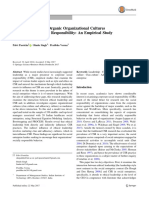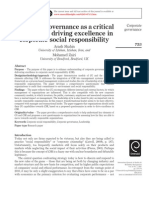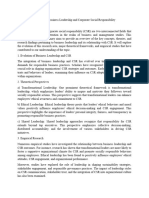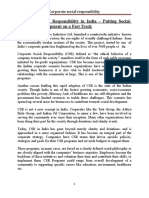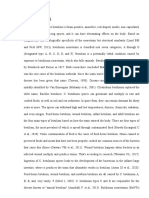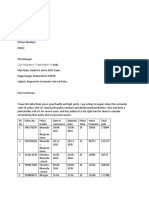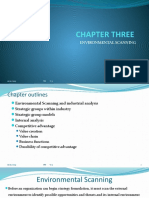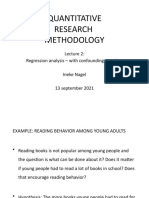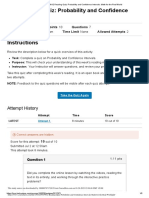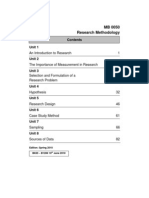Ethical Leadership in the Age of Corporate Social Responsibility: A
Comparative Study of Multinational Corporations
______________
Research Proposal
SEPTEMBER 2023
i
� ABSTRACT
The purpose of this research is to look into the connection between ethical leadership and CSR.
Data Collected from the Halliburton Office in Saudi Arabia The study will use a random sample
of 100 employees. The results will show how important it is for businesses to have leaders who
are ethical and responsible. Leaders need to improve their "people orientation," "power sharing
and fairness," "concern for sustainability," "ethical guidance," "integrity," and "role clarification"
to expand and strengthen corporate social responsibility, the survey found.
Keywords: Fairness, power sharing, people-oriented leadership, and corporate social
responsibility.
TABLE OF CONTENTS
ii
�ABSTRACT....................................................................................................................................ii
1. INTRODUCTION....................................................................................................................1
2. RELATED WORK...................................................................................................................4
Ethical Leadership........................................................................................................................4
Corporate Social Responsibility...................................................................................................7
3. PROBLEM STATEMENT / RESEARCH QUESTIONS.....................................................10
Problem Statement.....................................................................................................................10
4. OBJECTIVES........................................................................................................................10
Objectives...................................................................................................................................10
5. RESEARCH METHODOLOGY...........................................................................................11
Data Collection Methods...........................................................................................................11
Variables....................................................................................................................................11
Data and Type............................................................................................................................11
Sample of Research....................................................................................................................11
Estimation Techniques...............................................................................................................12
6. EXPECTED OUTCOME.......................................................................................................13
7. REQUIREMENTS / RESOURCES.......................................................................................13
RESEARCH PLAN.......................................................................................................................14
REFERENCES..............................................................................................................................15
iii
� 1. INTRODUCTION
There are many economic, social, and environmental challenges we face today, including: a
depressed economy; overpopulation; resource exploitation; extreme poverty (rich-poor gap);
unprecedented inequality; migration across borders; religious extremism and terrorism;
geopolitical and ecological crises; global warming and its impact on climate change;
environmental issues; competitive pressure; health concerns; and new information and
communication technologies. All these problems have made sustainable development and
social responsibility "hot" topics of discussion. In this period of sustainable development, "a
holistic framework, in which society aims for economic, social, and environmental goals"
(Sachs, 2015) is crucial. Integrating ethical, social, and environmental concerns into regular
corporate operations is difficult.
That which "a firm takes on a visible role in the society that goes beyond the core business
and beyond what the law requires and which leads to added value for the company and
society" (Sachs, 2015, emphasis in original) (emphasis in original).
Several books have been written on a wide range of topics, including corporate social
responsibility (CSR) and leadership. As you read this essay, keep in mind the growing
importance of CSR practises and the role of ethical leadership in implementing them.
Today's leaders must confront problems in the economic, social, and environmental sectors.
Leaders in today's fast-paced businesses must be resourceful in order to balance the needs,
objectives, and priorities of numerous constituents, some of whom may have divergent goals.
Unfortunately, public mistrust of businesses is rather widespread. Given the current climate's
volatility, business executives must take extra care to steer their companies in a more
sustainable direction.
To meet the economic, environmental, and social concerns of the twenty-first century,
leadership today must adapt to reflect the values of corporate social responsibility (CSR).
In this context, "ethical leadership" refers to a leader's consistent adherence to a set of core
moral values. A leader can set an example for his or her followers by acting in a socially
acceptable manner in their own interactions. In the West, researchers have spent a lot of time
looking at how ethical leadership affects business success, and they've found multiple
pathways linking the two (Shin et al., 2015; Eisenbeiss et al., 2015; Wang et al., 2017).
According to Shin et al. (2015), a more ethical leadership style leads to better business
outcomes by fostering a more just and honest workplace. Ethical leaders, according to Wang
et al. (2017), employ a humanistic management style, accept personal accountability, and
place a premium on environmental responsibility.
The term "corporate social responsibility" (CSR) refers to the practise by which firms
proactively incorporate social and environmental, ethical, and human rights issues into their
operations and relationships with their stakeholders. Our research demonstrates that the link
between ethical leadership and CSR has received considerable attention from academics
1
�(Saha et al., 2020). No research, however, has been conducted on the effect that ethical
leadership might have on a company's reputation and performance via CSR practises. Ethical
considerations remain, especially in economies in development. This would benefit
businesses operating in underdeveloped countries all over the world by increasing the
effectiveness of CSR initiatives and fostering more moral leadership.We looked at Vietnam
because it is a country in rapid development that has garnered significant foreign interest and
investment. Businesses in Vietnam have a solid foundational understanding of corporate
social responsibility, making the country an ideal platform for introducing CSR initiatives.
There are various and far-reaching benefits of CSR for the administration and development
of companies. By improving their standing in the eyes of their workforce and clientele,
businesses can boost their bottom line and provide themselves a competitive edge through
corporate social responsibility (CSR). Historically, CSR measures in Vietnamese businesses
were mandated by Western export rules. However, as Vietnamese consumers grow more
aware of the role corporations play in society, many Vietnamese businesses have come to
understand that CSR can help make their operations more sustainable and give them with an
edge in the market. But as Vietnam loses its competitive edge, pressure is mounting on
Vietnamese businesses to find a way to keep up or enhance their standing so they can take
advantage of brightening global prospects.
However, at the present day, corporations in Vietnam are more concerned with maximising
profits than they are with fostering long-term growth (Vuong et al., 2021). As there are
currently no studies on this topic in Vietnam and the existing studies are not applicable, there
is an urgent need for additional rigorous research that businesses and CSR practitioners can
rely on. Supporters of corporate social responsibility will find this study interesting because it
aims to examine the moderated mediation model linking ethics, CSR, company credibility,
and business outcomes.
2
� 2. RELATED WORK
Ethical Leadership
According to Huang and Paterson's (2017) research, ethical leadership requires its practitioners
to promote and reinforce these behaviours in others through conversation and choice, and to
model and support ethical behaviour in their subordinates by their own behaviours and
interactions.
Many authors and commentators have weighed in on the question of what constitutes an ethical
leader. According to the literature (Alshammari, Almutairi, & Thuwaini, 2015), an ethical leader
is someone who acts and makes decisions in accordance with their moral principles, values, and
beliefs. An ethical foundation is essential for managers to inspire and direct their teams to
victory. Ethics-based leadership is defined by the authors as "the means by which personnel are
influenced or transformed in accordance with a system of principles, values, and beliefs that
generally borders on recognised norms or the preferred mode of organisational behaviours." This
concept stresses the importance of leaders constantly striving to improve themselves so that they
can have a positive impact on the people they manage. Workers are more inclined to look up to
their bosses and wish to mimic their achievement when there is a clear moral separation between
the superiors and the rest of the firm. Managers should set a good example for their employees
because of their privileged position in the organisation. It's not simple to be in a position of
3
�moral authority, but you must always remember that others are depending on you to make the
right choices.
Ethical leaders not only encourage their subordinates to act in a moral manner, but also provide a
good example for those under them by their own actions. Researchers found that moderators like
self-efficacy and leader-member exchange helped establish a causal link between ethical
leadership and improved employee performance (Walumbwa et al., 2011). As can be seen from
the foregoing, ethical leadership isn't something that just happens; rather, it's a result of
deliberate effort on the part of everybody involved in all conversations and interactions.
To make sense of the phenomenon and its implications for the subjects, it is necessary to have a
firm grasp of the underlying theories in the field of ethical leadership. Using these concepts as a
foundation, we gain insight into the ethical relationship between a leader and their followers.
According to the LMX theory (Khuong, 2015), leaders and followers exchange resources
depending on their respective assessments of the worth of those resources and the level of
support each party anticipates from the other. Therefore, it is in everyone's best interest for
employees to maintain cordial relationships with their immediate superiors and managers. To
anticipate an employee's connection quality, social exchange theory takes into account the people
they interact with, the dynamics of those contacts, and the outcomes of those exchanges. What
moves a relationship ahead is the degree of investment made by both parties. As a result,
leadership plays a crucial role in group dynamics. It is reasonable to assume that superiors play a
substantial role in bolstering or growing LMXs, as they emerge through a sequence of exchanges
or transactions among leaders and followers. They play a vital role inside the LMX due to their
proximity to workers and function as first point of contact (Khuong, 2015). There appears to be a
link between ethical management and productivity, according to the literature (Khuong, 2015).
Al-Shammari, Al-Mutairi, and Thuwaini (2015) conducted research into the link between ethical
leadership and worker output. The writers looked into the connections between ethical leadership
and things like skill, commitment, and inspiration in the workplace. The authors draw the
conclusion that hard work and efficiency are increased under ethical leadership. They provide an
explanation for the motivating effect using the LMX paradigm and draw the conclusion that
direct supervision boosts motivation. This is because people working their way down the
corporate ladder prefer to mimic the actions of their superiors. As a result, a leader who acts
4
�ethically will garner the respect and admiration of his or her followers. Most research shows that
when leaders act ethically, they inspire greater teamwork from employees at all levels of an
organisation.
(Khuong, 2015) looked at what kinds of leadership in Vietnam inspire their employees. The
major purpose of the research was to identify and categorise the numerous elements that
employees report as assisting them in becoming more motivated and devoted to their professions.
The authors polled a statistically valid cross-section of accountants in HCMC, Vietnam.
According to the results, moral or ethical leadership is crucial for keeping workers motivated. In
addition to a clear work schedule, attractive pay, and good benefits, happy, cooperative
employees benefit from positive relationships with their coworkers. Seventy or more percent of
respondents cited ethical leadership as one of the top three criteria that motivates followers to
take action.
An inspired team is the lifeblood of any successful leader. Prospective employees often
emphasise their drive to succeed during interviews (Tu, Lu, & Yu, 2016). The author contends
that this is because they have learned the value of following their own motivations in the
workplace. So, CEOs should be careful to act in ways that inspire their teams to keep up the
company's stellar performance. To succeed, they need to act in a way that leaves no room for
doubt about their morals.
Social responsibility is more likely to be a top priority at businesses if the founder also serves as
CEO (Wu et al., 2015). This finding is supported by the authors' observation that it was more
common for organisations in which the founder continued to serve as CEO to have an ethical
culture that influenced their CSR efforts. The CEO has a special attachment to the company
because of his or her long history with it. Putting one's name on a business problem makes it
more important to everyone involved. Employees that feel their unique and creative
contributions are valued contribute more to the organisation as a whole. They also place a
premium on a moral code to direct their followers, leading to higher ethical standards and more
moral leadership than their external CEO rivals.
The combination of a good work ethic and a strong moral centre characterises a reliable person.
Those who have this trait are relied upon in their personal and professional lives (Boylan, 2014).
They hold honesty in the highest regard and make it a priority to behave consistently with their
5
�stated goals. When someone has a firm commitment to go somewhere at a certain time, they will
do everything it takes to be there on time. In addition, a trustworthy person will always go the
extra mile to ensure that all commitments are kept. Those who care deeply about their credibility
will do whatever it takes to keep it intact. If you want people to have faith in you, you have to
consistently put in long hours, no matter the weather. They devote a lot of time and energy to
their jobs because they care about doing a good job. One who provides their undivided attention
to a task until its completion demonstrates dedication.
Corporate Social Responsibility
No universally accepted definition of "corporate social responsibility" exists. It's not easy to
come up with a single, all-encompassing definition. In another scenario, numerous individuals
and organisations hold divergent yet interconnected points of view. The idea of "corporate social
responsibility" stems from the belief that businesses owe their communities more than just a duty
to follow the law and make a profit (Schwartz, 2014). The author defines corporate social
responsibility (CSR) as a company's consistent commitment to doing good for society at large,
the economy, and its employees. However, people in authoritative roles have a responsibility to
prioritise public interest over self-interest when making decisions. Corporate social responsibility
(CSR) is defined by Kotler and Lee (2013) as a "clear and public commitment to enhancing
community well-being through transparent business practises and contributions of business
resources." The authors note that firms are obligated to behave in the public interest under the
corporate social responsibility framework.
Corporate social responsibility is still often viewed as a form of philanthropy or community
service by many. Even more so, it is viewed by some as a way to compensate for any
wrongdoing firms may have committed in the pursuit of profit. Businesses should always do
some form of ethical checking (Kotler & Lee, 2013). Put another way, government officials
won't pursue an idea if it isn't good for society or at least neutral. Executives would say they
would put financial and public relations gains ahead of any potential harm to the community.
Examining how leaders' moral behaviour influences specific parts of the workplace is also
necessary for gauging the effect of ethical leadership on social responsibility. The quality of
work done by employees is the primary factor. Managers are responsible for inspiring efficiency
in their teams. That's why managers lay out their expectations for workers' behaviour.
6
�Executives set the tone for the organization's culture and determine its moral compass.
Executives at the top level have a major effect on staff outcomes such as productivity,
performance, and decision making. Humans are intended to flourish in cultures that value ethics
and morality. Morally and ethically upright people often rise to the top of their fields. Those that
have such strong emotional attachment to their jobs are dedicated to them and will always
perform to the best of their abilities. Since they look up to their superiors, they try to mimic their
actions.
The public and its consumers continue to be drawn to businesses that invest in a socially
responsible manner, despite the increased emphasis on a company's need to go beyond the short-
term boost to its image that comes from its support of a noble cause. This is good for both the
public's perception of a firm and the company's own brand. Fortune's annual ranking of the most
admired companies in the United States includes social responsibility as a factor for review,
which is cited by the writers. Each year, Business Ethics recognises the top 100 most socially
and environmentally responsible corporations based on their appraisal of the company's social
and environmental policies and practises. Many different groups take an interest in determining
whether or not a company operates ethically and legally. The public's perception of a company
and its products will improve if it appears on one of these lists. (Kotler & Lee, 2013) also claim
that governments and regulatory bodies are less likely to investigate and even help corporations
that engage in socially responsible projects. If a corporation has a comprehensive corporate
social responsibility plan, the public is more likely to see it objectively and not be too harsh on it
when it is the subject of an investigation.
7
� 3. PROBLEM STATEMENT / RESEARCH QUESTIONS
Problem Statement
The purpose of this research is to investigate the link between ethical leadership and CSR.
Training corporate managers to act ethically to better their firms' CSR activities requires a
thorough grasp of the connection between ethical leadership and CSR. Once implementation is
transferred to corporate management, new avenues for increasing organisational participation in
CSR matters are likely to be discovered and explored.
Research Questions
Is there a connection between moral leadership and doing good for society at large??
4. OBJECTIVES
Objectives
1) Assess the degree to which Ethical Leadership and CSR are interrelated.
2) Assess the impact that Ethical leadership has on CSR initiatives.
8
� 5. RESEARCH METHODOLOGY
Data Collection Methods
Primary Data
Questionnaires will be sent out to those who responded to the Ethical Leadership Survey and
have direct contact with employees. One hundred workers will complete the Ethical
Leadership questionnaire.
Secondary Data
Books, journals, papers, and the internet will be mined for secondary material.
Variables
Independent Variables: Ethical Leadership, corporate social responsibility
Dependent Variables: Customer satisfaction and customer retention
9
�Data and Type
Primary data, which is collected firsthand, will be used in this quantitative analysis because it is
more reliable than secondary data. In order to compile this information, we will have our staff
complete out surveys modelled after the Ethical Leadership Survey. Each participant will be
asked the same set of questions and encouraged to include detail from their own experiences,
relevant examples, and theoretical frameworks in their responses. Questions pertaining to Ethical
Leadership, CSR, Reputation, and Performance will all make use of the Likert scale for analysis.
Sample of Research
Participants in the Ethical Leadership Survey are the primary targets of the current investigation.
The Ethical Leadership Survey focuses mostly on employees because they are the ones that
interact with management on a regular basis. The survey will involve 100 in-person interviews
with randomly selected participants. Since they are more reliable and unique, primary sources
will be favoured.
Estimation Techniques
To analyse and categorise the data, we will utilise descriptive statistics, ratio analysis, and factor
analysis. We will examine the dependent and independent variables by computing and analysing
percentages, frequencies, means, standard deviations, and variances in SPSS tables.
10
� 6. EXPECTED OUTCOME
Organisational success and public participation were two areas studied to determine whether
or not ethical leadership made a difference.Because of its narrow focus on how ethical
behaviour in leadership affects CSR, this study has room for improvement.
In addition, the research included information from only one company.However, the factors
that businesses consider when giving back to or investing in their communities need to be
scrutinised more closely. REQUIREMENTS / RESOURCES
Use Google's suite of office productivity apps to make your own PDFs, surveys, and
presentations.
A way to access the Internet
Original information (to be gathered)
Information gathered from sources other than the primary source
SPSS Software • Grammarly • Mendeley • Turnitin • Other Tools
11
� RESEARCH PLAN
GANNT CHART
ACTIVITIES AUGUST SEPTEMBER OCTOBER NOVEMBER DECEMBER
Topic
submission
Proposal
submission
Interim Report
Writing
Interim Report
Submission
Final Report
Writing
Final Report
Submission
12
� REFERENCES
Alshammari, A., Almutairi, N.N. and Thuwaini, S.F., 2015. Ethical leadership: The effect
on employees. International Journal of Business and Management, 10(3), p.108.
Boylan, J.F., 2014. Trans Bodies, Trans Selves: A Resource for the Transgender Commu-
nity. Oxford University Press, USA.
Eisenbeiss, S.A., Van Knippenberg, D. and Fahrbach, C.M., 2015. Doing well by doing
good? Analyzing the relationship between CEO ethical leadership and firm perfor-
mance. Journal of Business Ethics, 128, pp.635-651.
Huang, L. and Paterson, T.A., 2017. Group ethical voice: Influence of ethical leadership
and impact on ethical performance. Journal of management, 43(4), pp.1157-1184.
Khuong, M.N., 2015. The Effect of Ethical Leadership and Organizational Justice on
Employee Engagement--The Mediating Role of Employee Trust. International Journal
of Trade, Economics and Finance, 6(4), p.235.
Kotler, P., and Lee, N.R. 2015. Social marketing: Changing behaviors for good. Sage
Publications.
Sachs, J.D., 2015. The age of sustainable development. In The Age of Sustainable Devel-
opment. Columbia University Press.
Saha, R., Shashi, Cerchione, R., Singh, R. and Dahiya, R., 2020. Effect of ethical leader-
ship and corporate social responsibility on firm performance: A systematic review. Cor-
porate Social Responsibility and Environmental Management, 27(2), pp.409-429.
Shin, Y., Sung, S.Y., Choi, J.N. and Kim, M.S., 2015. Top management ethical leader-
ship and firm performance: Mediating role of ethical and procedural justice cli-
mate. Journal of business ethics, 129, pp.43-57.
Spector, P.E., 2014. Job satisfaction: Application, assessment, causes, and conse-
quences (Vol. 3). Sage.
Tu, Y., Lu, X. and Yu, Y., 2017. Supervisors’ ethical leadership and employee job satis-
faction: A social cognitive perspective. Journal of Happiness Studies, 18, pp.229-245.
Vuong, Q.H., La, V.P., Nguyen, H.K.T., Ho, M.T., Vuong, T.T. and Ho, M.T., 2021.
Identifying the moral–practical gaps in corporate social responsibility missions of Viet-
13
� namese firms: An event‐based analysis of sustainability feasibility. Corporate Social Re-
sponsibility and Environmental Management, 28(1), pp.30-41.
Walumbwa, F.O., Mayer, D.M., Wang, P., Wang, H., Workman, K. and Christensen,
A.L., 2011. Linking ethical leadership to employee performance: The roles of leader–
member exchange, self-efficacy, and organizational identification. Organizational behav-
ior and human decision processes, 115(2), pp.204-213.
Wang, D., Feng, T. and Lawton, A., 2017. Linking ethical leadership with firm perfor-
mance: A multi-dimensional perspective. Journal of business ethics, 145, pp.95-109.
Wu, L.Z., Kwan, H.K., Yim, F.H.K., Chiu, R.K. and He, X., 2015. CEO ethical leader-
ship and corporate social responsibility: A moderated mediation model. Journal of Busi-
ness Ethics, 130, pp.819-831.
14
















